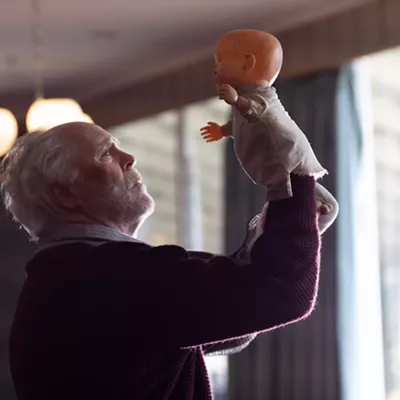Watching His Three Daughters, a confined drama about death that bursts with life, I thought of the last time my dad visited me in Washington from neighboring Idaho. It'd been a good while since I'd seen him and, while it was great to reconnect, I found myself thinking about what the world will someday be like without him. It terrified me and, no matter how much I tried to push these painful thoughts away, I couldn't shake them. Yet I couldn't find the words to talk about them.
His Three Daughters, written and directed by Azazel Jacobs, is about our struggle to find these words before the end. It's a film that's honest, painful and poetic without ever losing sight of the three most well-written and acted characters of the year — the ones also struggling with finding the right words.
Christina (Elizabeth Olsen), Rachel (Natasha Lyonne), and Katie (Carrie Coon) are three sisters who could not be more different than each other. They have all gone in different directions in their lives with some starting families, and some not. Some have remained close to their father, and some have not. Yet now they all find themselves in the same New York apartment with their father dying in his bedroom, the steady beeping of the machines monitoring his vitals continually reminding us of why all have gathered. They go through the stages of grief, with past pain and resentments coming tumbling out as they seek some small sense of grace. The result is a remarkable work that's one of the most layered films about loss ever put to screen.
Jacobs, who most recently made 2021's French Exit, also serves as editor and cuts together what is his best film yet. He makes something that is so precisely attuned to the rhythms of pain and loss that it can be almost too hard to watch the way grief grabs hold of the tiny apartment where the trio find themselves. There are moments that are wonderfully funny, with arguments that reveal so much about each sister's state of mind and their respective pasts, though there is still no escaping what's coming.
What each fixates on or doesn't cuts deep, gradually ensuring we see all of the raw emotional parts of the sisters that they are not yet able to speak aloud. Though we barely see into the room where their father lies dying, only catching glimpses of the machines and rarely the man himself, this reserved approach serves a profound purpose. This distance puts us in the minds of all of them as we feel their quiet uncertainty about how to approach the looming loss.
None of us, no matter who we are, will ever be fully ready for the death of our parents. This is what makes His Three Daughters not only emotionally resonant, but existentially truthful. The film's most daring moment comes in a quite surprising narrative and formal disruption near the end. It pulls the rug out from under everything, making explicit how life's search for the right words to provide closure can just as easily slip through our fingers.
Rarely will we get a moment to reflect back on life and what we wish we could have said to those we love. That's the stuff of movies, but our reality is not so simple, even as we may desperately wish it was. When death comes knocking for us all, it's not something you can completely prepare for as much as you can brace for the brutal impact and the shattered pieces it leaves behind in its wake.
This is what makes His Three Daughters that much more transcendent. It doesn't hide away from the truths that we all must face, just as its characters all struggle to speak them out loud. It's in this simple journey that life becomes breathtakingly, painfully beautiful right before the end. The film's final spectacular series of scenes finds the right words, but not in the way you'd expect. I'm still searching for those words for myself, but I hope one day I'll speak them before it all comes to a close. ♦





















